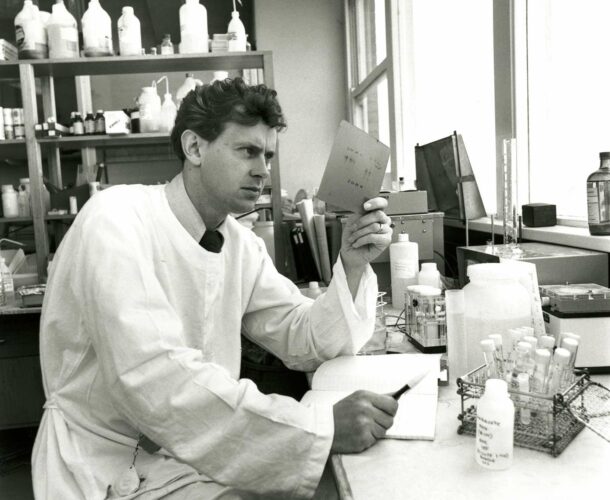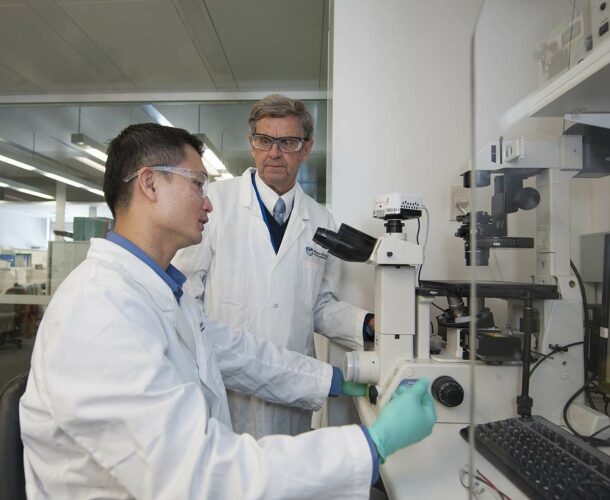Today Professor Burgess AC is recognised as one of Australia’s pre-eminent cancer researchers.
Burgess was an integral member of the CSFs team, with Professor Donald Metcalf, that led the discovery and development of CSFs. Burgess played a lead role in purifying GM-CSF, the first CSF to be discovered, then as part of the team that cloned GM-CSF. The discoveries have led to a treatment that has helped more than 20 million cancer patients worldwide.
While working at the Ludwig Institute for Cancer Research, Burgess’ focus began to shift to other cancer interests, exploring the epidermal growth factor (EGF) receptor and colon cancer.
Concentrating on clinical outcomes
In 2002 was part of a Parkville precinct collaboration (including Ludwig, Walter and Eliza Hall Institute and CSIRO scientists) that revealed the three-dimensional structure of EGF, the key to designing drugs that inhibit its activation.
This facilitated the development of an anti-EGFR antibody (mAb806) that sniffs out tumour cells and bypasses normal ones. It is now being used to deliver a toxin to brain tumour cells in promising clinical trials – “a nice Australian contribution to a complicated subject” says Burgess. He hopes it will be recognised.
Following the decision by Ludwig to centralise its operations, he transferred his work on colon cancer to the Walter and Eliza Hall Institute. Today Burgess’ program is largely translational – that is, pushing into the clinical sphere. “We’ve developed two small molecule anti-cancer agents that are going out into the wild world of biotechnology,” he says.
But a particular passion is pursuing the potential to reduce the incidence of colon cancer through chemoprevention.
“Close to 80 per cent of colon cancers start with a single genetic mutation in the bowel that leads to polyps. They’re not cancerous, but become cancerous over a 10 year period.” Current screening programs urge people in the at-risk age group – over 50 – to send submit samples for faecal immunochemical tests or to have colonoscopies. But uptake is low.
Daily pill to prevent bowel cancers
Burgess’ alternative aims to offer people over 60 a daily course of tablets for one week every five years which would get rid of any polyps before they enter the cancerous phase. “We know the biology well enough and this indicates that you could take two simple chemicals” – both tried and tested drugs – “and kill the polyp cells before they become cancerous.
“I think chemoprevention, if it is a simple drug that isn’t going to hurt anyone and it works, is very worthwhile. Now I’ve got to prove that in animals, and then prove the concept works in people.” He hopes to have the animal data this year, and begin human trials next year.
“I’ve been lucky to be involved in the CSFs story,” Burgess says. Now it is exciting to see our EGF receptor work being developed for clinical application.
“It is most rewarding when your research, as basic as it is, translates into something that helps people.
“It would be great if could finish my research career by identifying a way to reduce colon cancer.”








